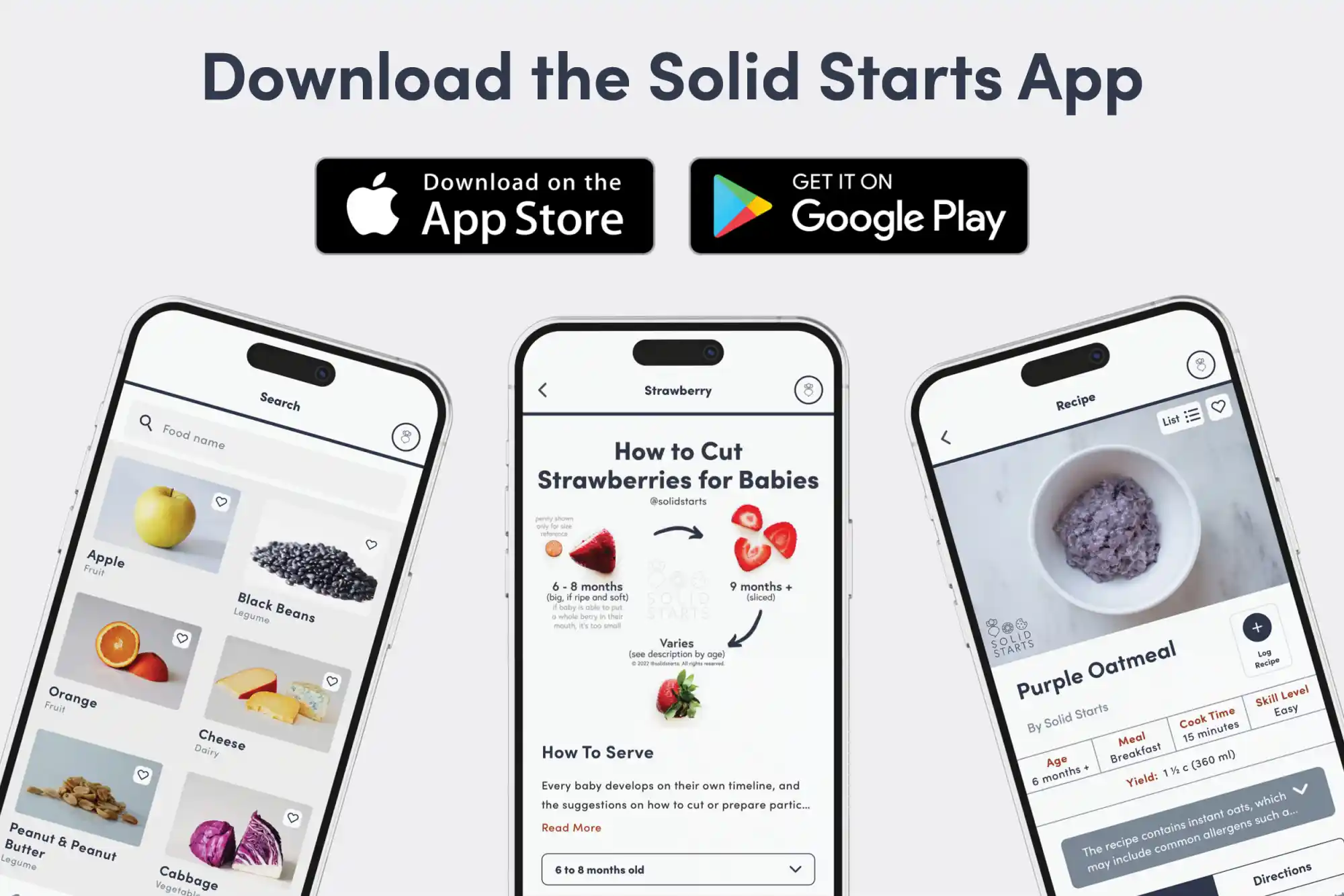Access our First Foods® Database in the Solid Starts App.
Learn moreMascarpone Cheese
Dairy
Age Suggestion
6 months
Iron-Rich
No
Common Allergen
Yes

When can babies have mascarpone cheese?
Mascarpone cheese may be introduced as soon as baby is ready to start solids, which is generally around 6 months of age. Choose pasteurized mascarpone cheese to minimize the risk of foodborne illness.
Mascarpone is a style of fresh unripened cheese made from the cream of cow’s milk. Full of flavorful milk fats, mascarpone is just a step away from butter, with fat comprising around 75% of the cheese compared to 80% in butter. In fact, mascarpone is so rich that it is often used like butter in polenta, risotto, and other dishes of Italy, the origin place of mascarpone cheese. It hails from the Lombardi region, where dairy farmers learned to coagulate the cream with tartaric acid—the tiny residual crystals at the bottom of a wine cork or barrel. Yes, that’s right: one of the world’s beloved drinks helps produce one of the world’s beloved fresh cheeses.
How do you serve mascarpone cheese to babies?
Every baby develops on their own timeline, and the suggestions on how to cut or prepare particular foods are generalizations for a broad audience.
6 months old +:
Spread a thin layer of pasteurized mascarpone on toast for baby to grab and munch on. You can also add mascarpone to egg strips or frittatas, or stir the cheese into mashed vegetables or grains for baby. Avoid serving mascarpone with added honey, which is associated with a risk of infant botulism.
9 months old +:
As baby’s fine motor control develops, try sticking age-appropriate pieces of fruit or vegetables in a bowl of pasteurized mascarpone for baby to grab and dip. Continue to add mascarpone to egg strips or frittatas, or stir it into mashed vegetables or grains.
12 months old +:
Continue offering pasteurized mascarpone on its own, stirred into mashed vegetables, added to sauces and stuffing, or mixed into batters for muffins, pancakes, and quick breads. For toddlers who can’t get enough of mascarpone, use the cheese as a vehicle to introduce new flavors from herbs and spices. You can also offer mascarpone with a small bowl of seasoning on the side, and invite toddlers to flavor the cheese as they see fit.
Mix up your mornings with ideas from our guide, 50 Breakfasts for Babies & Toddlers.
Videos
Is mascarpone a choking hazard for babies?
No. Mascarpone cheese presents a low risk when safely prepared for a child’s age and developmental ability, though, in theory, an individual could choke on any food. To reduce the risk, prepare and serve mascarpone in an age-appropriate way as described in the How to Serve section. As always, make sure you create a safe eating environment and stay within an arm’s reach of baby during meals.
Learn the signs of choking and gagging and more about choking first aid in our free guides, Infant Rescue and Toddler Rescue.
Is mascarpone cheese a common allergen?
Yes. Mascarpone cheese is often made from cow’s milk, which is classified as a common allergen by the World Health Organization. It is an especially common food allergen in young children, accounting for about one-fifth of all childhood food allergies. Keep in mind that dairy products from other ruminants such as sheep, goat, and buffalo may provoke similar allergic reactions to cow’s milk dairy products. That said, there’s good news: milk allergy often disappears with time. Research shows that the majority of children with cow's milk allergy will outgrow it by age 6, and many babies with milder symptoms of milk protein allergy (which can show up as painless blood in stool) are able to successfully reintroduce cow's milk as early as their first birthday, with the guidance of their appropriate pediatric health professionals.
Milk is a common cause of food protein-induced enterocolitis syndrome, also known as FPIES. FPIES is a delayed allergy to food protein which causes the sudden onset of repetitive vomiting and diarrhea to begin a few hours after ingestion. This is termed acute FPIES. Left untreated, the reaction can result in significant dehydration. When milk is in the diet regularly, FPIES can present as reflux, weight loss, and failure to thrive - this is termed chronic FPIES. Symptoms generally improve with elimination of milk from the baby’s diet. Thankfully, like other forms of milk allergy, FPIES which presents early in life is generally outgrown by the time a child has reached 3-5 years of age.
Lactose intolerance, which is when the body has a hard time processing lactose, the sugar that is naturally present in milk, can sometimes be mistaken for an allergy, as it can result in bloating, gas, diarrhea, nausea, and other discomfort. Be sure to connect with an appropriate pediatric health care professional for any questions about lactose intolerance, and know there are many lactose-free dairy foods available.
If you suspect baby may be allergic to milk, consult an allergist before introducing dairy products like cheese. Based on a baby’s risk factors and history, your allergist may recommend allergy testing, or may instead advise dairy introduction under medical supervision in the office. If the risk is low, you may be advised to go ahead and introduce cheese in the home setting. As with all common allergens, start by serving a small quantity on its own for the first few servings, and if there is no adverse reaction, gradually increase the quantity over future meals. If you have already introduced milk and ruled out an allergy, pasteurized cheeses can be introduced as desired, without any need to start small and build up over time.
Is mascarpone cheese healthy for babies?
Yes. Mascarpone is rich in fat and also offers small amounts of calcium, choline, protein, vitamin A, and zinc. These nutrients work together in fueling baby’s growth and development, offering energy for play and movement, as well as supporting bone, brain, immune, and skin health. Choose pasteurized mascarpone cheese to minimize the risk of foodborne illness.
Do I need to start solids with purees?
You can if you’d like, but there's no developmental need to start with textureless food. Babies can be served modified versions of what you eat. Use our First Foods Database to find how to safely serve any food.
What are some great first foods for babies?
There are many wonderful options. Look for foods that are easy for baby to feed to themselves, that are low in choking risk, and that offer nutrients babies need, such as iron. A few of our favorite first foods include cooked broccoli, oatmeal, and mango pits.
Our Team
Written by
Expert Tips Delivered to Your Inbox
Sign up for weekly tips, recipes and more!
Copyright © 2026 • Solid Starts Inc






